2021
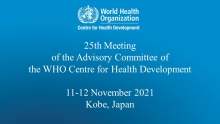
Advisory Committee congratulates WHO Kobe Centre on impressive results
The Advisory Committee of the WHO Centre for Development in Kobe (WHO Kobe Centre - WKC) has commended the Centre for impressive progress in its research portfolio and local engagement, and excellent research achievements in the thematic areas of universal health coverage and health emergencies and disaster risk management. The 25th annual meeting was held online on 11-12 November 2021.
The Director-General of WHO appoints the Advisory Committee which comprises representatives from each of the six WHO Regions, the host country, the local area, and the Kobe Group.[1] The Kobe Group provides generous material and financial support to the work of WKC.
This year, WKC Director Dr Sarah Barber welcomed three new Advisory Committee members: Mr Yasutaka Katayama, Vice Governor of Hyogo Prefectural Government representing the Kobe Group; Dr Hajime Inoue, Assistant Minister for Global Health and Welfare in the Ministry of Health, Labour and Welfare (MoHLW), representing the host government; and Professor Reiko Sakashita, Vice President of the University of Hyogo representing the local community.
The Governor of Hyogo Prefecture, Honorable Motohiko Saito, expressed his gratitude to the WHO Centre for Health Development for providing evidence-based information on COVID-19 to the Prefecture and community. He was reassured that the Centre was working on ageing and dementia, given the urgent need in Japan to reform social systems in areas such as medical and long-term care and pensions.
Dr Inoue expressed his appreciation for the efforts of the Kobe Group and others in supporting the work of the WHO Kobe Centre over the past 25 years. The Ministry of Health, Labour and Welfare assured its support to WKC in its future action and work.
Dr Viroj Tangcharoensathien, Secretary General of the International Health Policy Program Foundation in the Ministry of Public Health, Thailand, said: “WKC’s work aligns extremely well with WHO’s 13th General Programme of Work (GPW13), which strengthens collaboration with WHO Headquarters and regional offices, particularly the European and Western Pacific Regions".
One such collaboration was with the European Observatory on Health Systems and Policies to develop a very practical, innovative tool, the Population Ageing financial Sustainability gap for Health systems (PASH) Simulator.
Professor Maged Al- Sherbiny, Higher Education Senior Advisor, Direct Aid International, Kuwait commented: “I fell in love with the PASH simulator which allows policymakers to see how both health expenditures and revenues are expected to change due to changes in population aging. It supports the finding that how population ageing affects health financing is a policy choice. I hope we can disseminate this message clearly to policymakers.”
[1] The Kobe Group comprises the Hyogo Prefectural Government, Kobe City, the Kobe Chamber of Commerce and Industry, and Kobe Steel Ltd.
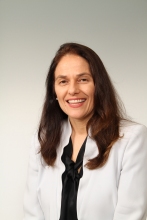
2021 UHC Day Message of Dr Sarah Barber, WHO Kobe Centre Director
This year on 12 December, the world will celebrate Universal Health Coverage (UHC) Day to raise awareness for the need for strong, equitable and resilient health systems and universal health coverage. UHC advocates for everyone, everywhere to have access to quality essential health services without suffering financial hardship.
This year’s theme is Leave no one’s health behind: invest in health systems for all. At the WHO Kobe Centre (WKC), much of our research focuses on this goal, providing evidence for policymakers on financing healthcare and ensuring access to health services even while countries undergo rapid population ageing so that older people do not get left behind.
Based on WKC input, the 2021 WHO/World Bank Global Monitoring Report on Financial Protection in Health includes data on adults at older ages facing financial hardship due to health care utilization, to ensure that the needs of older adults are recognized in achieving UHC targets. Among the findings from WKC research included in this report is the result of a meta-analysis of the prevalence of foregone health care covering 56 countries which found that about 1 in 10 people forgo health care, mainly due to unaffordability. Nearly twice as many older people forgo health care compared to younger adults.
A separate WKC-supported study in Viet Nam found that, even with health insurance, older people frequently do not seek health care when they have an illness or injury, and instead do nothing or self-medicate. The findings also suggest that households with older people suffering from chronic diseases experience the most financial hardship due to health care utilization.
To contribute to our community, WKC is partnering with local researchers to understand unmet care needs among older people in the Kansai region of western Japan. Understanding the difficulties faced by older people in paying for health care services could help ensure financial protection of older people in the Kansai region with implications for other settings. We sincerely thank our local research partners, some of whom have sent us messages in support of this UHC Day.
UHC means working together for a healthier, more equitable world. We call on leaders, policymakers and people to make smart choices about investing in health systems, inclusive of the needs of all, especially older persons. #HealthForAll #UHCDay
Dr Sarah Louise Barber
Director: WHO Centre for Health Development (WHO Kobe Centre
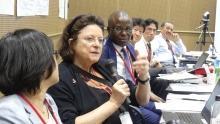
Third Core Group Meeting: health emergencies research network
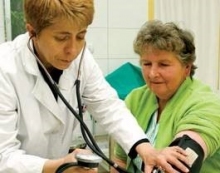
EURO Long-Term Care Forum focuses on WKC/OECD publication
The WHO European Regional Office Long-Term Care Forum was organized on November 4, and the organizers focused on the recent WKC/OECD publication about pricing long-term care for older persons. The forum was facilitated by Drs Satish Mishra and Stefania Ilinca of the WHO EURO Office.
Dr Sarah L Barber, Director WKC, presented the overall findings of the WKC/OECD study, followed by presentations of country case study results by Ricarda Milstein, Germany; Naoki Ikegami, Japan; and Luca Lorenzoni, Sweden and the USA. London School of Economics colleague, Maria Karagiannidou, presented experiences from Greece.
The discussion was attended by colleagues throughout the European region and focused on the challenges of financing long-term care. The WKC/OECD study can be found at https://extranet.who.int/kobe_centre/en/project-details/pricesetting2
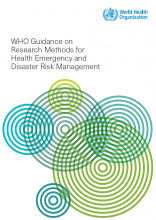
WHO publishes the first reference book on research methods for managing health emergencies and disaster risk
The WHO Kobe Centre (WKC) has coordinated a new reference book “WHO Guidance on Research Methods for Health Emergency and Disaster Risk Management” to address the serious research gap for informing policy and practice in this emerging field.
Seeking to address this, WKC convened an expert meeting in October 2018 in Kobe to identify key research needs in Health Emergency and Disaster Risk Management (Health EDRM). Research methods and ethics were identified as research priorities.
“The best possible evidence is crucial for managing the health risks of emergencies and disasters. The Guidance aims to fill the gap in the evidence base in Health EDRM. It will also support the implementation of the Sendai Framework for Disaster Risk Reduction 2015-2030 and the Sustainable Development Goals,” said project coordinator and WKC’s technical officer, Dr Ryoma Kayano.
The book has contributions from over 160 global experts from 30 countries, WHO headquarters and all Regional Offices. It contains 43 chapters covering a wide range of research fields. Case studies provide real-life examples of research methods and how they have modified policies. It will be useful for health professionals in Health EDRM, students and academics, government agencies and ministries, international organizations, and community and civil society organizations.
Read more here, and watch videos on the background and introduction to the Guidance.
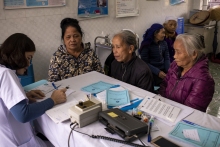
Key concepts for measuring equity in health care access for older people
Regular measurement and monitoring of health system performance is essential for countries to progressively advance universal health coverage (UHC). However, older people may be left behind because their healthcare needs are not being adequately considered in monitoring global progress towards UHC.
During April 2020 to May 2021, the WHO Kobe Centre, in partnership with researchers at the University of Sheffield, University of Liverpool and Osaka University, undertook a scoping review to see how equity in health care access and service coverage of older people should be measured.
The findings showed that it is particularly important to pay attention to older people’s complex care needs, capacity to make decisions and accessibility of services. Even in Japan which has universal health and long-term care insurance, several studies have revealed, for example, regional disparities in availability of services that older people need.
The scoping review found several concepts in common with current UHC monitoring frameworks such as availability, affordability and quality of services. As there is no consensus on the exact measurements to be used for these concepts, countries can develop locally relevant indicators of equity in service coverage for older populations that can be incorporated into UHC monitoring.
For key findings, read the Evidence Summary.
Read more about this project here.

Is financial hardship causing older people in Japan’s Kansai Region to miss out on health services?
Japan has several policies and programmes to protect its citizens from financial hardship due to high health spending, a fundamental principle of universal health coverage (UHC). However, the Kansai region has a high rate of households on public assistance. Given that many households have older members, little is known about whether or how many older people forego health services because of financial hardship.
On 1 October 2021, WHO Kobe Centre, in collaboration with researchers at the Kyoto University, Graduate School of Medicine, Department of Healthcare Economics and Quality Management, started a new project that explores how older people in the Kansai region pay for health care services including long-term care. We will identify if these older people are missing out on services that they need and, if so, why.
Through a mail survey and follow-up interviews with medical social workers in hospitals, local governments, and relevant community-based agencies, we will also identify policies that could be better utilized and more effectively implemented in the Kansai region. This is likely to have implications for policy and practice to strengthen financial protection for older people utilizing health care in Kansai.
Read more about this new project here.
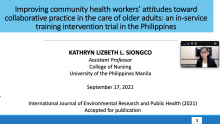
Virtual research conference on interprofessional education to advance care for older adults
Interprofessional education plays an important role in preparing the health workforce to deliver quality integrated care that meets the needs of older people. On 17 September 2021, researchers from the WHO Kobe Centre, Tokyo Medical and Dental University, the University of the Philippines, Manila, and Hue University of Medicine and Pharmacy, Viet Nam, gathered virtually to present their research findings to an international audience. The online conference was hosted by Dr Keiko Nakamura, Co-Principal Investigator of the research project and Professor of Tokyo Medical and Dental University’s Global Health Entrepreneurship Programme. Over forty participants from nine countries participated in the event.
The presentations highlighted key findings from different phases of the multi-year and multi-country research project. Dr Megumi Rosenberg, Technical Officer of the WHO Kobe Centre, gave an overview of global population aging trends and the WHO Kobe Centre’s research programme on advancing universal health coverage in the context of global population aging. In 2018-20, the WHO Kobe Centre carried out this research project that aimed to develop and evaluate a competency-based interprofessional education programme for health and social care workers in the Philippines, which can be adapted for use in Viet Nam and other low- and middle-income countries.
Responding to a question from the audience about how to get aging and health on the agenda of low- and middle-income countries, Dr Rosenberg emphasized the importance of research evidence that can convince policy makers of the urgent need to invest in strengthening health systems in light of rapid population aging and of the return on those investments to people and society.
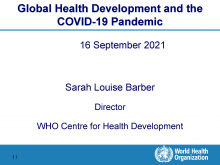
Online lecture to the Kobe Fukiai High School
Kobe Municipal Fukiai High School has been designated as the hub school of the World Wide Learning Consortium (WWL) by the Ministry of Education since April 2019. As part of the school’s program to widen views about global issues, Dr Sarah Barber, Director of WHO Centre for Health Development, gave an online lecture to more than 100 students in the International Course and English course on 16 September 2021. The presentation discussed Universal Health Coverage, and there were questions and answers about COVID -19 including the benefits of vaccination.
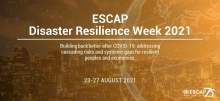
Panelist at the International Symposium organized by the United Nations Office for Disaster Risk Reduction
On August 27, 2021, Dr Ryoma Kayano, WHO Kobe Centre, participated as a panelist in an international symposium organized by the United Nations Office for Disaster Risk Reduction.
The symposium, entitled "Risk communication for better disaster risk management", discussed experiences in risk communication during disasters, based on findings from COVID-19 and other disasters and focused on key challenges and opportunities in the digital and social media era to enhance disaster risk management capacity.
Dr Kayano introduced the WHO Thematic Platform for Health Emergency and Disaster Risk Management Research Network (TPRN) of which WKC is the secretariat. He shared the latest findings on priority issues in the field of disaster and health risk management.

